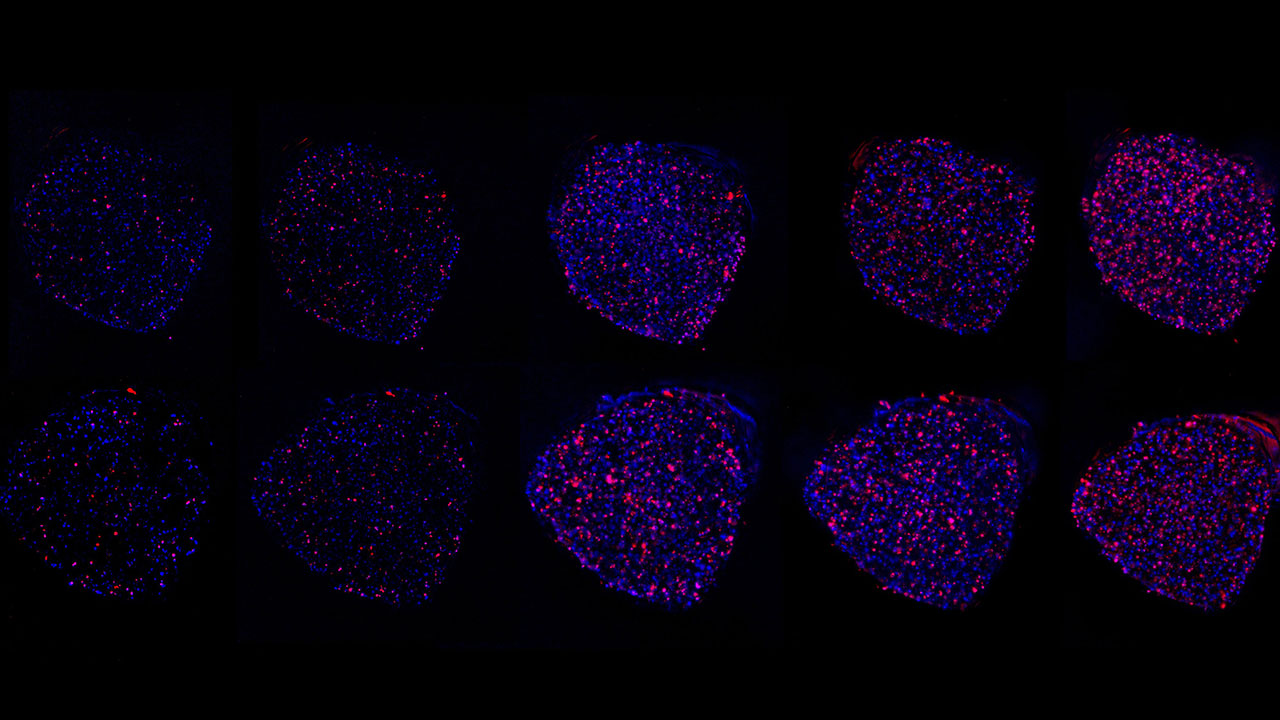Your Tumor’s Best Treatment? A Space-Based Test Could Tell You

This microscopic image captures how microgravity allows tumor cells to self-assemble into clusters, mimicking their behavior in the human body.
Media Credit: Encapsulate
With new NASA and NSF funding, Encapsulate is building on its ISS National Lab-sponsored research to bring personalized cancer diagnostics closer to clinical use
July 31, 2025
KENNEDY SPACE CENTER (FL), July 31, 2025 – What if your cancer treatment could be tested in space—before it’s ever used on you? A biotech startup is leveraging the unique microgravityThe condition of perceived weightlessness created when an object is in free fall, for example when an object is in orbital motion. Microgravity alters many observable phenomena within the physical and life sciences, allowing scientists to study things in ways not possible on Earth. The International Space Station provides access to a persistent microgravity environment. environment onboard the International Space Station (ISSInternational Space Station) to do just that, using real patient tumors to predict how they’ll respond to treatment before a single dose is given.
Featured in the latest issue of Upward, the official magazine of the ISS National Laboratory®, Encapsulate’s tumor-on-a-chip system grows patient biopsy samples into miniature tumors that are tested with different drugs in space. “Technically, it’s not even a prediction now,” said CEO and Co-Founder Armin Rad in the article. “It’s an observation of what would work the best on the tumor.”
Backing this innovation, Encapsulate recently secured a $3.63 million grant from NASA’s In Space Production Applications (InSPA(Abbreviation: InSPA) InSPA is an applied research and development program sponsored by NASA and the ISS National Lab aimed at demonstrating space-based manufacturing and production activities by using the unique space environment to develop, test, or mature products and processes that could have an economic impact.) program and a $1.25 million Small Business Innovation Research (SBIR) award from the U.S. National Science Foundation. These funds will accelerate the further development and clinical validation of the tumor-on-a-chip system in collaboration with top cancer centers. Also, this month, Encapsulate launched a larger clinical study in collaboration with UConn Health, Moffitt Cancer Center, Memorial Sloan Kettering Cancer Center, and other institutions. The study will profile 100 to 200 patients with colorectal and pancreatic cancers using Encapsulate’s system.
Encapsulate’s first experiments launched on SpaceX’s 30th commercial resupply mission, contracted by NASANational Aeronautics and Space Administration. An autonomous CubeLab, developed in collaboration with ISS National Lab Commercial Service ProviderImplementation Partners that own and operate commercial facilities for the support of research on the ISS or are developing future facilities. Space Tango, monitored tumor responses in microgravity.
“The astronauts didn’t need to touch anything,” Rad explains in Upward. “Honestly, they just plugged it in like a coffee machine.”
In space, the absence of gravity allows cloned tumors to grow in more complex 3D shapes that more accurately mimic their development in the human body than traditional laboratory models. Some tumors with specific mutations reacted to chemotherapy drugs in space but not on Earth, revealing hidden behaviors.
Beyond drug response, microgravity exposed early tumor cell movement patterns linked to metastasis. In Upward, Joel Levine, director of UConn Health’s colon cancer prevention program and a research collaborator, explains, “If I told you that you could predict that event from the day of the biopsy, you would have thought that’s counterculture. But maybe we’ve been watching cancer unfold too late in the story.”
Encapsulate’s approach aims to end the guesswork in cancer treatment by providing precision diagnostics for personalized care. “What you get out of the test of that tumor is really analogous to this being tested in you,” Levine added.
For more on this and other groundbreaking research, explore the latest issue of Upward.
Download a high-resolution image for this release: Tumor cell clusters
Media Contact:
Patrick O’Neill
904-806-0035
PONeill@ISSNationalLab.org
# # #
About the International Space Station (ISS) National Laboratory: The International Space Station (ISS) is a one-of-a-kind laboratory that enables research and technology development not possible on Earth. As a public service enterprise, the ISS National Laboratory® allows researchers to leverage this multiuser facility to improve quality of life on Earth, mature space-based business models, advance science literacy in the future workforce, and expand a sustainable and scalable market in low Earth orbit(Abbreviation: LEO) The orbit around the Earth that extends up to an altitude of 2,000 km (1,200 miles) from Earth’s surface. The International Space Station’s orbit is in LEO, at an altitude of approximately 250 miles.. Through this orbiting national laboratory, research resources on the ISS are available to support non-NASA science, technology, and education initiatives from U.S. government agencies, academic institutions, and the private sector. The Center for the Advancement of Science in Space® (CASIS®) manages the ISS National Lab, under Cooperative AgreementA cooperative agreement is Federal assistance that establishes a relationship between the U.S. Government and a recipient in which the principal purpose of the relationship is to accomplish a public purpose of support or stimulation. Since 2011, the Center for the Advancement of Science in Space™ (CASIS™) has managed the National Laboratory® through a Cooperative Agreement with NASA. with NASA, facilitating access to its permanent microgravity research environment, a powerful vantage point in low Earth orbit, and the extreme and varied conditions of space. To learn more about the ISS National Lab, visit our website.
As a 501(c)(3) nonprofit organization, CASIS(Abbreviation: CASIS™) The nonprofit organization that manages the ISS National Lab, which receives at least 50 percent of the U.S. research allocation on the International Space Station to facilitate research that benefits humanity (NASA manages the other 50% and focuses on research for space exploration purposes). accepts corporate and individual donations to help advance science in space for the benefit of humanity. For more information, visit our donations page.